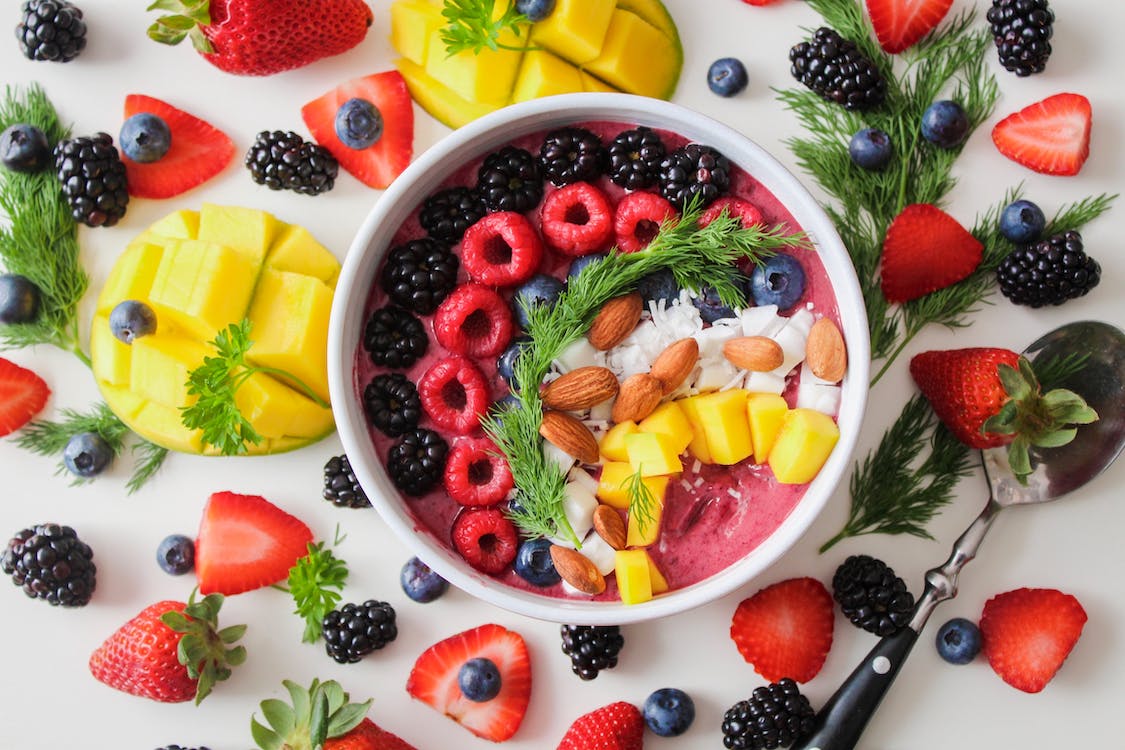
As an athlete, the quest for peak performance begins the moment you wake up. The key to unlocking your full potential? It’s not just the hours spent in training, but the very first meal of your day. That’s where the concept of the “best breakfast for athletes” comes into play. This isn’t about indulging in a lavish feast or following a rigid diet; it’s about understanding the unique nutritional needs that fuel your athletic endeavors. Whether you’re preparing for a marathon, gearing up for a game, or simply aiming to enhance your daily workout routine, the right breakfast can set the tone for success. In this article, we delve into a variety of breakfast options that are not only delicious but are precisely tailored to meet the high-energy demands and nutritional requirements of athletes. From the importance of balancing macronutrients to the role of hydration and timing, we’ll explore how the best breakfast for athletes can be your secret weapon in achieving your fitness goals.
Table of Contents
10 Good Breakfast for Athletes: Review
Protein-Packed Oatmeal
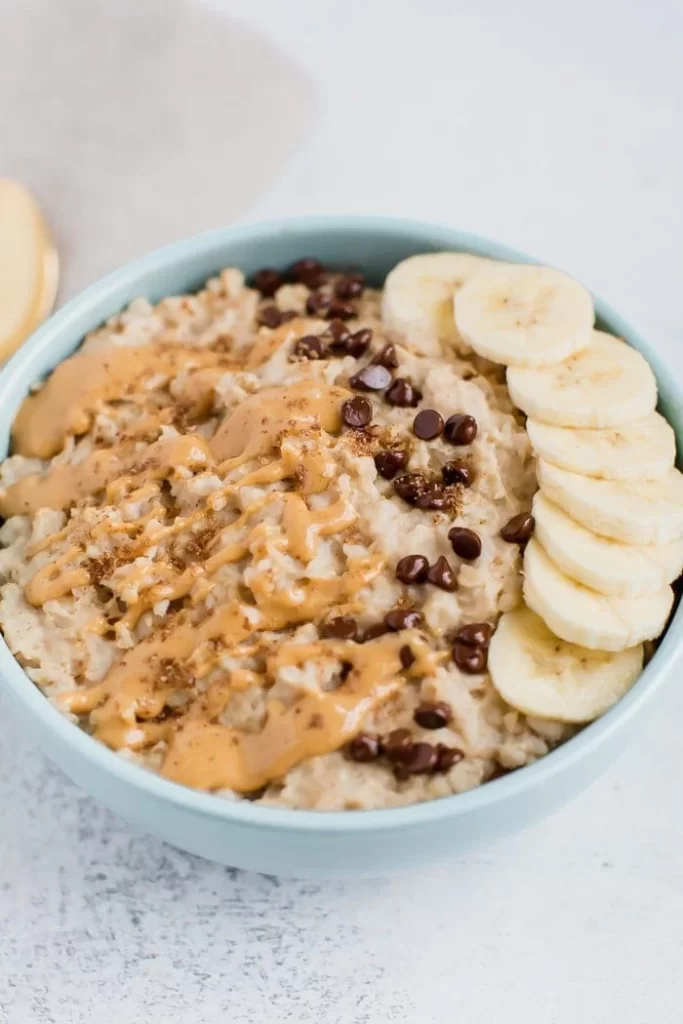
Ingredients: 1/2 cup rolled oats, 1 cup almond milk, 1 scoop protein powder, 1 tablespoon almond butter, 1 banana, sliced, cinnamon to taste.
Recipe: Cook oats with almond milk until desired consistency. Stir in protein powder and almond butter. Top with banana slices and a sprinkle of cinnamon.
Greek Yogurt Parfait
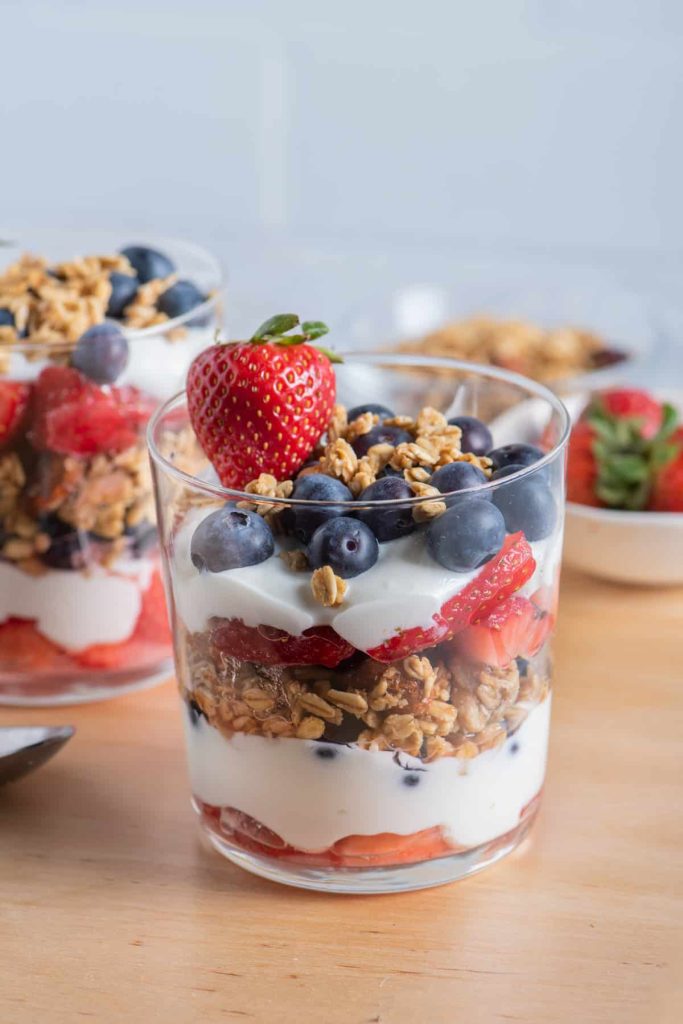
Ingredients: 1 cup Greek yogurt, 1/4 cup granola, 1/2 cup mixed berries, 1 tablespoon honey.
Recipe: Layer Greek yogurt with granola and berries in a bowl or glass. Drizzle with honey.
Spinach and Feta Omelette
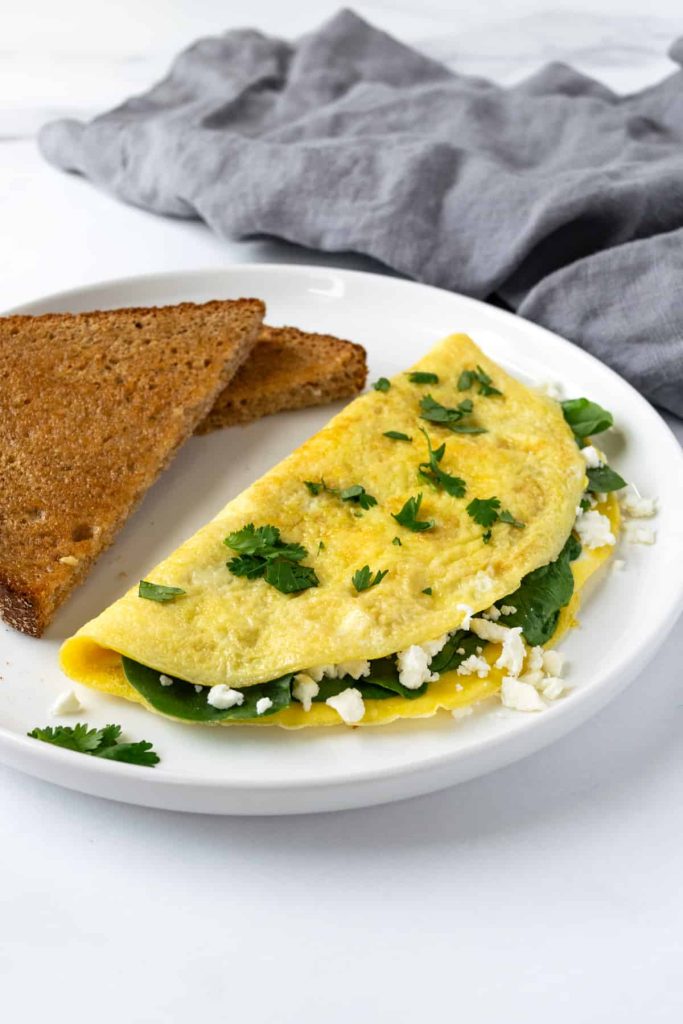
Ingredients: 3 eggs, 1 cup spinach, 1/4 cup feta cheese, salt, and pepper.
Recipe: Whisk eggs and pour into a heated skillet. Add spinach and feta cheese. Cook until eggs are set, fold, and serve.
Banana and Almond Butter Toast
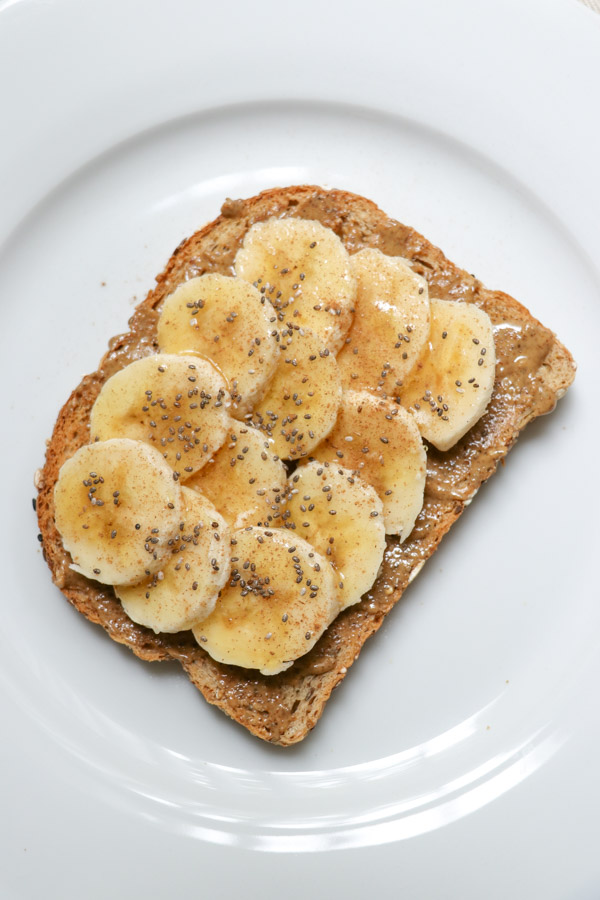
Ingredients: 2 slices whole-grain bread, 2 tablespoons almond butter, 1 banana, sliced, chia seeds for topping.
Recipe: Toast bread, spread almond butter on each slice, top with banana slices and sprinkle with chia seeds.
Avocado and Egg Breakfast Wrap
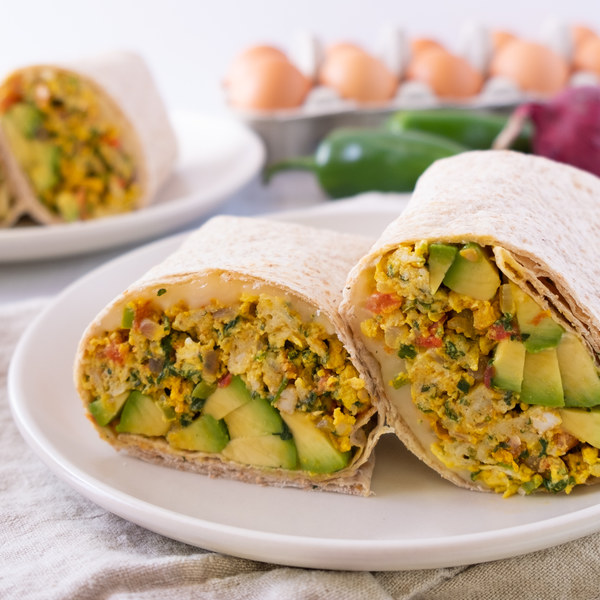
Ingredients: 2 whole wheat tortillas, 2 eggs, 1 avocado, sliced, 1/4 cup salsa.
Recipe: Scramble eggs and place on tortillas. Top with avocado slices and salsa. Roll up and serve.
Smoothie Bowl
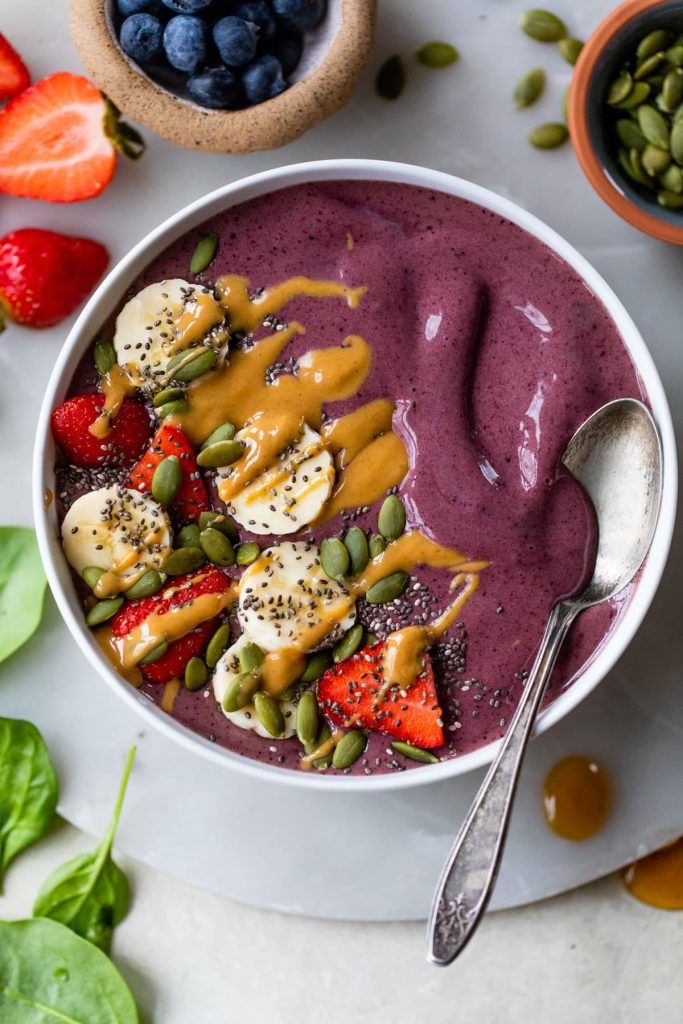
Ingredients: 1 banana, 1/2 cup mixed berries, 1 cup spinach, 1/2 cup Greek yogurt, 1/4 cup almond milk, toppings: granola, coconut flakes, nuts.
Recipe: Blend banana, berries, spinach, yogurt, and almond milk until smooth. Pour into a bowl and add toppings.
Quinoa and Berry Breakfast Bowl
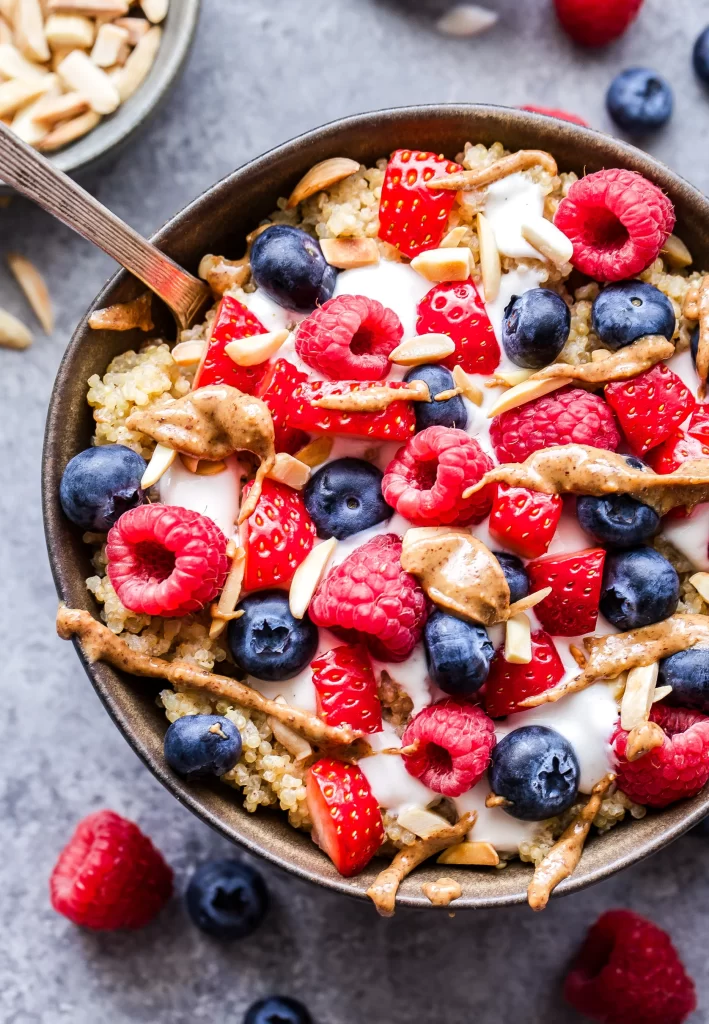
Ingredients: 1/2 cup cooked quinoa, 1/2 cup mixed berries, 1/4 cup chopped nuts, honey or maple syrup.
Recipe: Combine quinoa with berries and nuts in a bowl. Drizzle with honey or maple syrup.
Cottage Cheese and Fruit Plate
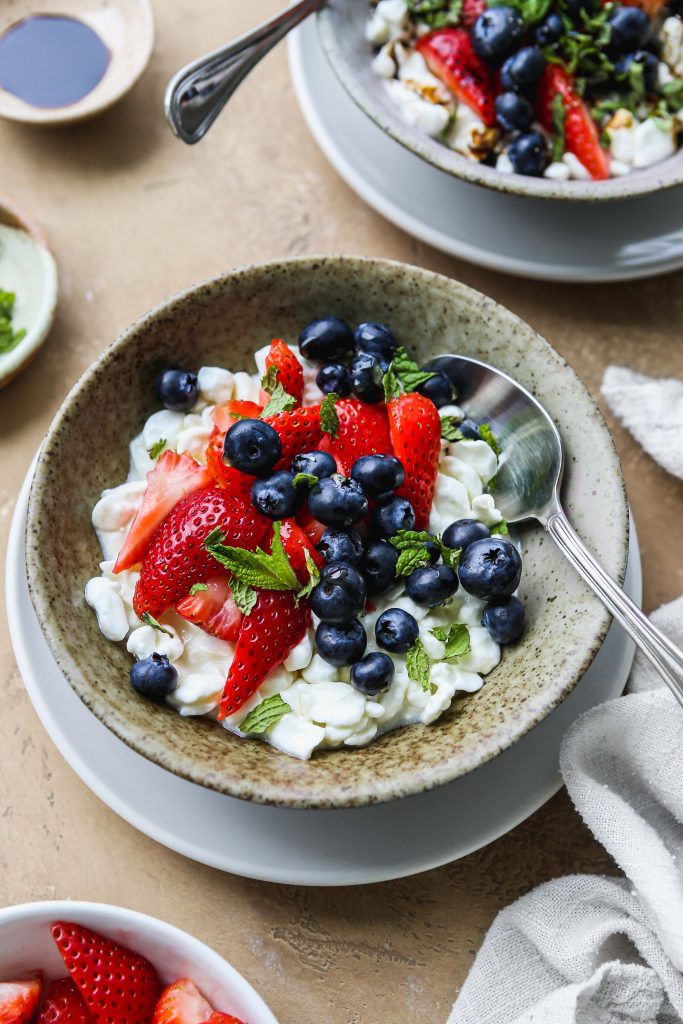
Ingredients: 1 cup cottage cheese, 1/2 cup pineapple chunks, 1/2 cup sliced strawberries, 1 tablespoon pumpkin seeds.
Recipe: Place cottage cheese in a bowl and top with pineapple, strawberries, and pumpkin seeds.
Sweet Potato and Black Bean Breakfast Burrito
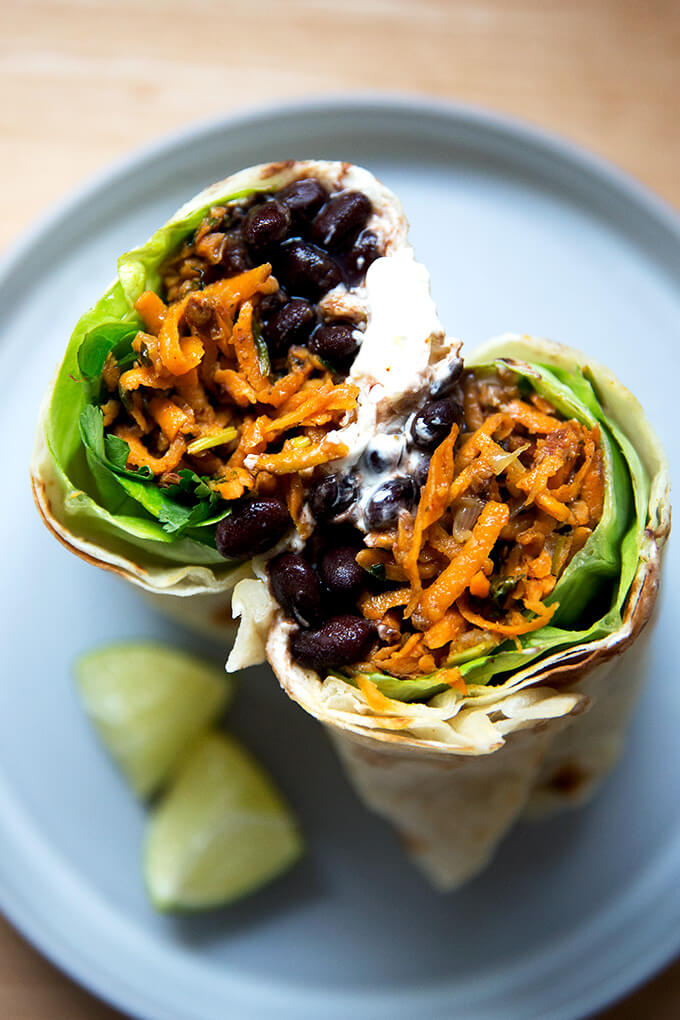
Ingredients: 1 medium sweet potato, cubed and roasted, 1/2 cup black beans, 2 whole wheat tortillas, 1/4 cup shredded cheese, salsa.
Recipe: Divide sweet potato and black beans between tortillas, sprinkle with cheese. Roll up and serve with salsa.
Overnight Protein Chia Pudding
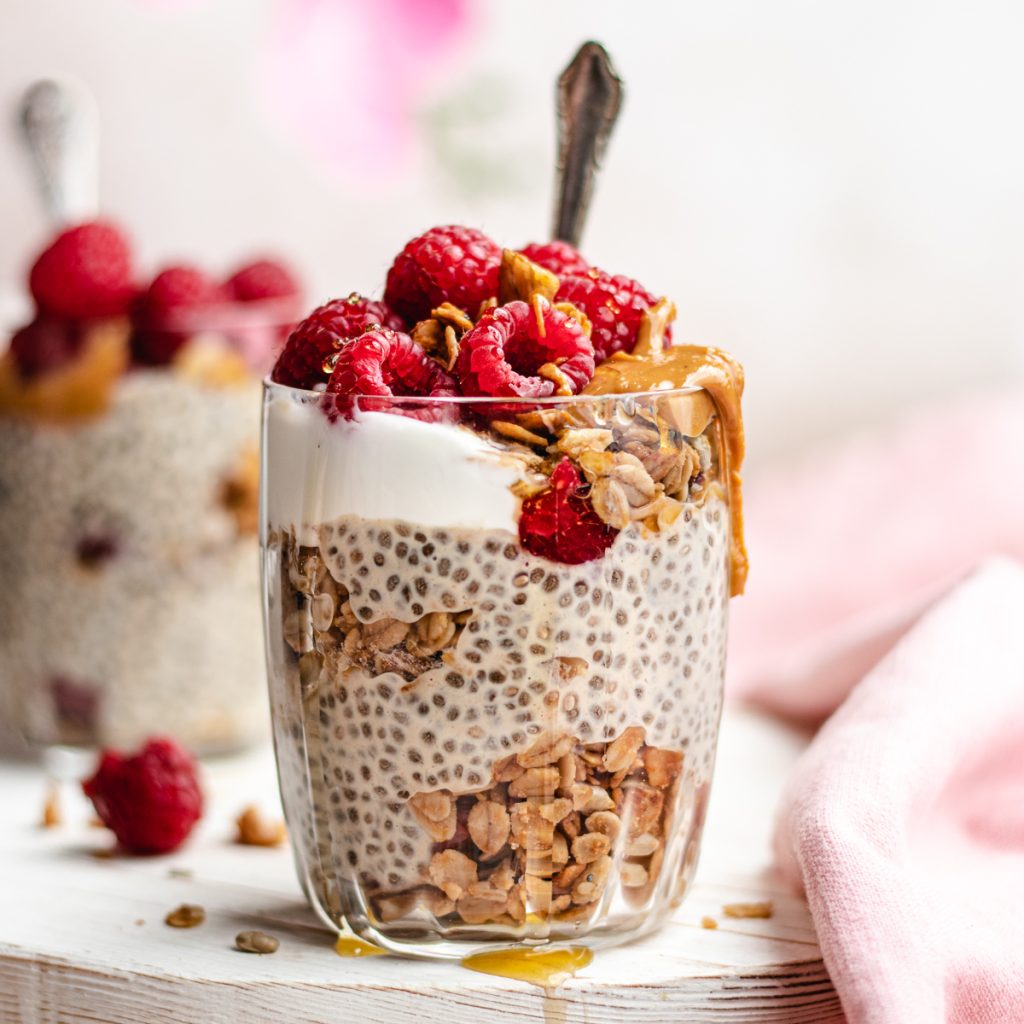
Ingredients: 1/4 cup chia seeds, 1 cup almond milk, 1 scoop protein powder, 1 tablespoon maple syrup, 1/2 cup berries.
Recipe: Mix chia seeds, almond milk, protein powder, and maple syrup in a jar. Refrigerate overnight. Top with berries before serving.
Importance of Breakfast for Athletes
The importance of breakfast for athletes cannot be overstated, as it plays a crucial role in their overall performance and health. Here are some key reasons why breakfast is particularly important for athletes:
- Refueling Energy Stores: After an overnight fast, the body’s energy stores are depleted. Breakfast replenishes these stores, particularly glycogen, which is crucial for endurance and high-intensity training.
- Enhancing Performance: A well-balanced breakfast can improve concentration, mood, and cognitive function. This is vital for athletes who need to maintain focus and make quick decisions during training or competition.
- Supporting Muscle Health: Protein-rich breakfasts are essential for muscle repair and growth. Consuming protein in the morning aids in recovery from training sessions and helps in building muscle mass.
- Maintaining a Healthy Weight: A nutritious breakfast can help in weight management, which is crucial for many athletes. It aids in regulating appetite and can prevent overeating later in the day.
- Boosting Metabolism: Eating breakfast kick-starts the metabolism, helping the body to start burning calories from the beginning of the day. This metabolic boost is important for athletes to maintain energy levels and manage body composition.
- Providing Nutrients for Overall Health: Breakfast is an opportunity to consume vital nutrients like vitamins, minerals, and antioxidants. These nutrients support overall health, immune function, and can reduce the risk of chronic diseases.
- Improving Training Outcomes: Consistent fueling with a balanced breakfast can lead to better training adaptations. Athletes who eat breakfast tend to have more energy and endurance during training sessions, leading to improved performance over time.
In summary, breakfast provides athletes with the necessary fuel and nutrients to perform at their best, supports muscle health, aids in weight management, kick-starts metabolism, and contributes to overall health and training outcomes. Skipping breakfast can lead to decreased energy, poor performance, and can negatively impact health and training goals.
Tackling Obstacles to Breakfast for Athletes
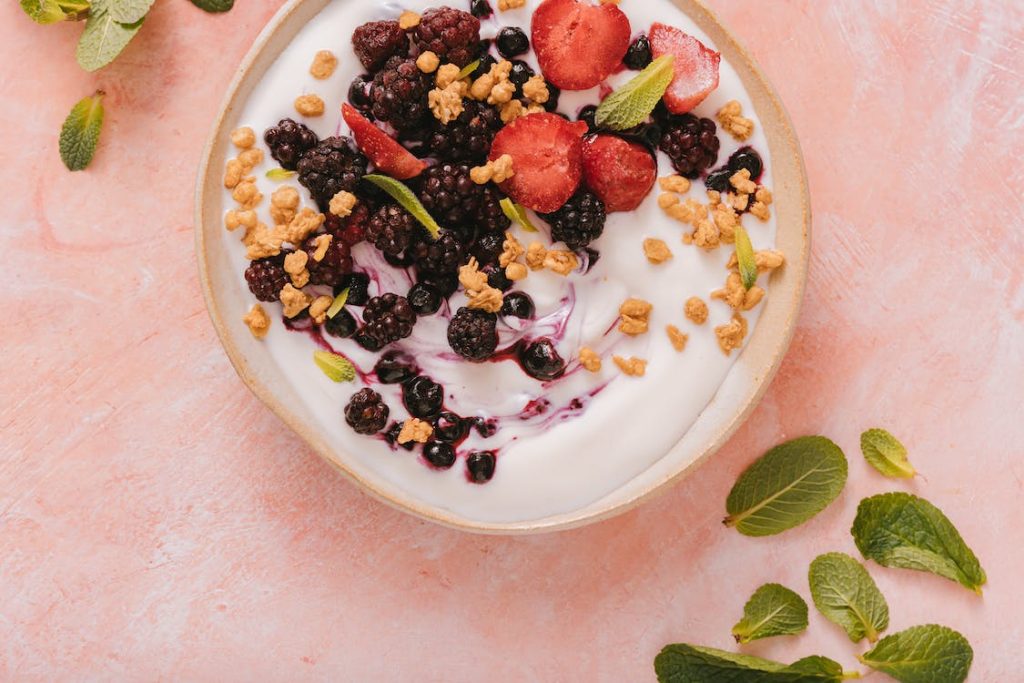
After exploring the importance of breakfast for athletes, you might be more inclined to reconsider skipping this vital meal, even if it’s not currently part of your routine. We recognize, though, that integrating breakfast into a busy schedule can present challenges. Here are some effective strategies to overcome common hurdles associated with the first meal of the day.
Pressed for time? Keep in mind that breakfast needn’t be an elaborate affair. Explore on-campus options for grab-and-go meals that allow you to easily take food with you. Stock your dorm room with convenient, ready-to-eat items like nutrient-dense whole food bars, chocolate milk, and single-serve yogurts. These can be a quick fix before heading out for your workout or daily activities.
Struggle with morning hunger? You can gently encourage your digestive system to adapt to morning eating, much like you train your muscles. Starting with easy-to-digest liquids, such as smoothies, is a great way to begin. They’re an excellent way to ensure you’re getting carbs, protein, and hydration early in the day.
Not a fan of traditional breakfast fare? No problem! Breakfast doesn’t need to be limited to typical morning foods. The key is to include the essential nutritional components we’ve discussed, regardless of the form they take. Feel free to think outside the box with options like last night’s dinner leftovers, sandwiches, quesadillas, or even savory oatmeal. The goal is to fuel your body effectively for the day ahead, regardless of the menu.
What Should Athletes Eat for Breakfast?
Athletes should focus on a breakfast that is balanced and nutrient-dense to fuel their bodies for the demands of their training and competitions. Here’s what they should typically include in their breakfast:
- Carbohydrates: They provide the primary source of energy for the body, especially important for endurance athletes. Good choices include whole grains (like oatmeal, whole-grain bread, and cereals), fruits, and starchy vegetables.
- Proteins: Essential for muscle repair and growth, proteins should be a staple in an athlete’s breakfast. Sources can include eggs, Greek yogurt, cottage cheese, lean meats, and plant-based options like tofu or tempeh for those who are vegan or vegetarian.
- Healthy Fats: Fats are important for long-term energy, hormone production, and cell health. Include sources like avocados, nuts, seeds, and olive oil.
- Fruits and Vegetables: These provide essential vitamins, minerals, and fiber, as well as antioxidants that can help with recovery and overall health. Berries, citrus fruits, leafy greens, and bell peppers are great options.
- Hydration: Starting the day with hydration is crucial. Water, herbal teas, or milk (dairy or plant-based) are good choices.
- Dairy or Dairy Alternatives: For calcium and vitamin D, which are important for bone health, include dairy products or fortified alternatives.
- Whole Food Sources: Whenever possible, athletes should choose whole food options over processed foods to maximize the nutritional benefits of their meals.
The exact composition of breakfast can vary depending on the athlete’s specific sport, training schedule, dietary preferences, and nutritional needs. It’s important for athletes to listen to their bodies and adjust their food intake based on their activity levels and personal health goals.
What is a Balanced Breakfast?
A balanced breakfast is crucial for kick-starting your day with the right nutrients. It’s a combination of carbohydrates, proteins, healthy fats, and a mix of vitamins and minerals. This combination ensures sustained energy, supports bodily functions, and contributes to overall well-being.
Carbohydrates are the body’s primary energy source. Opt for complex carbs found in whole grains like oatmeal, whole-grain bread, and cereals. They provide long-lasting energy and are rich in fiber, aiding in digestion and keeping you full longer.
Proteins are key for muscle repair and growth, and they help in satiety. Include eggs, Greek yogurt, cottage cheese, or lean meats for animal-based proteins. Plant-based alternatives like tofu, tempeh, and legumes are excellent for those who prefer a vegetarian or vegan diet.
Healthy Fats are essential for brain health and overall energy. Sources like avocados, nuts, seeds, and olive oil add richness and help in absorbing fat-soluble vitamins.
Fruits and Vegetables should also be part of your breakfast. They provide essential vitamins, minerals, and antioxidants, as well as fiber. Fresh fruits like berries, citrus, and bananas or vegetables like spinach or tomatoes can be easily incorporated into your meal.
Dairy or Dairy Alternatives are important for their calcium and vitamin D content, which are vital for bone health. Milk, yogurt, or cheese, or plant-based alternatives like almond or soy milk, can be included.
Finally, Hydration is important. A glass of water, herbal tea, or a dairy or plant-based milk alternative can help to rehydrate your body after the overnight fast.
A balanced breakfast sets the tone for your day, providing the necessary fuel for your activities and contributing to your overall nutritional health. Remember, the key is variety and moderation to cover all nutritional bases.
Conclusion
In wrapping up our exploration of the best breakfast for athletes, it’s clear that starting the day with the right nutrition sets the foundation for peak performance and optimal health. The journey through various athlete breakfast ideas has highlighted not just the importance of the meal itself, but the flexibility and creativity that can be employed in its preparation. From quick grab-and-go options to nutrient-packed smoothies, from traditional breakfast items to innovative uses of leftovers, the possibilities are endless. Athletes are encouraged to personalize their morning meals, considering their unique dietary needs, preferences, and training schedules. Remember, a well-planned breakfast is more than just a meal; it’s fuel for your ambitions and a crucial step in your daily routine to achieve athletic excellence. So, whether you’re a seasoned athlete or just starting out, embrace these athlete breakfast ideas and witness the positive impact on your performance and overall well-being. Let your first meal of the day be a powerful statement of your commitment to your sport and your health.

I’m Daniel Palenov, a passionate sports enthusiast with experience in boxing, MMA, tennis and running. My approach to training, shaped by these diverse disciplines, combines strength and strategy. Here you’ll find not only insightful equipment reviews, but also inspiring personal stories to help you achieve peak performance. My goal is to share the vibrant energy of sports, helping you on your path to health and excellence. Join me on this journey of athletic discovery and personal growth.